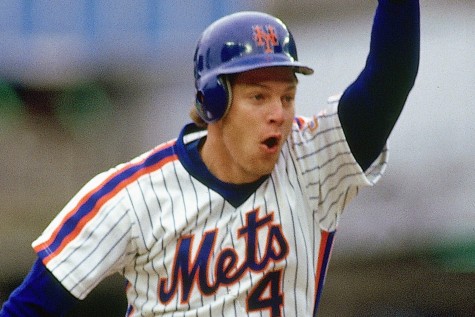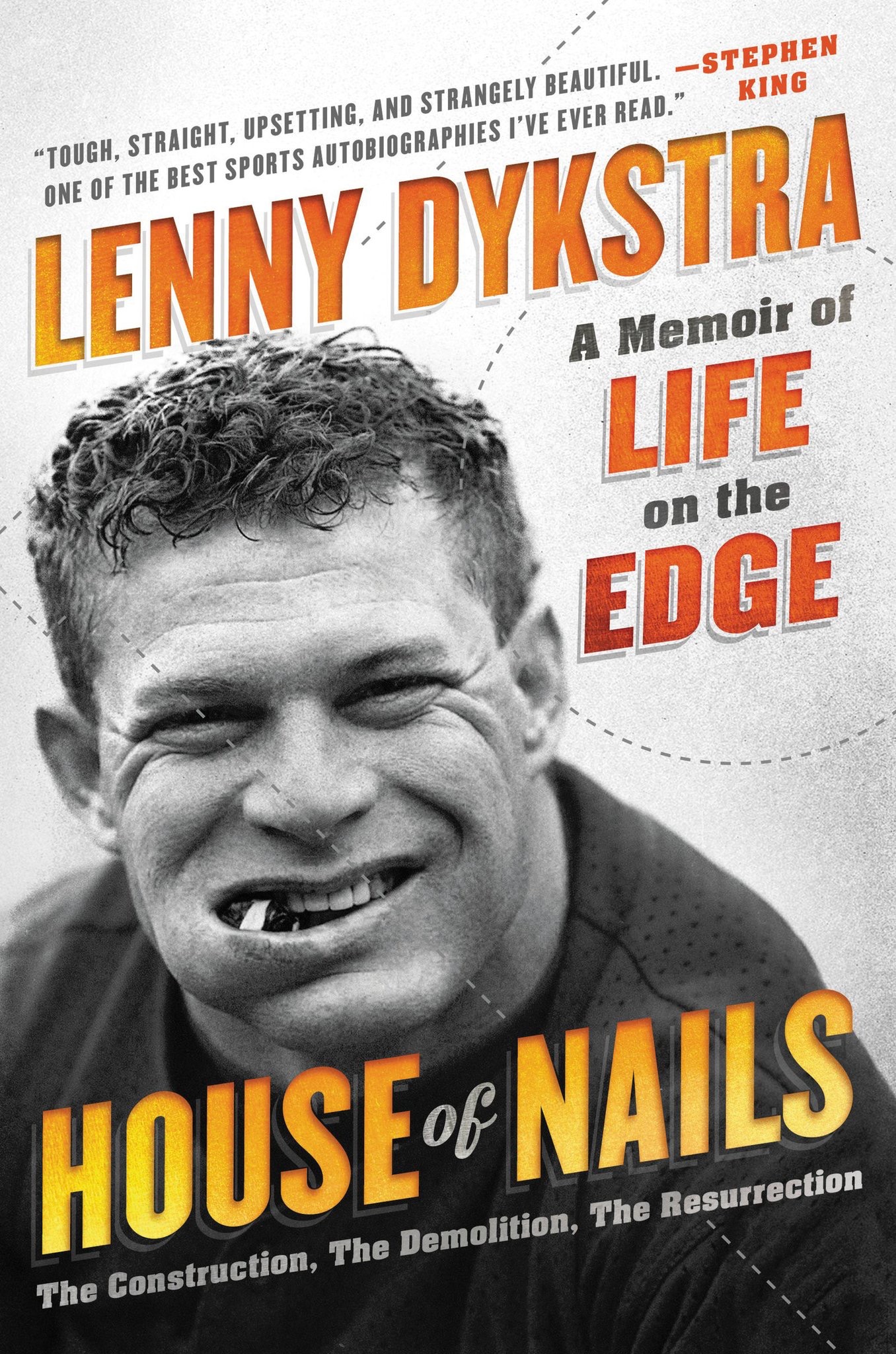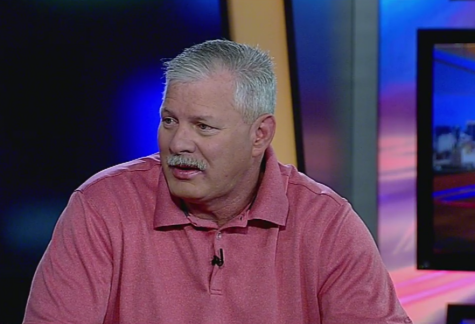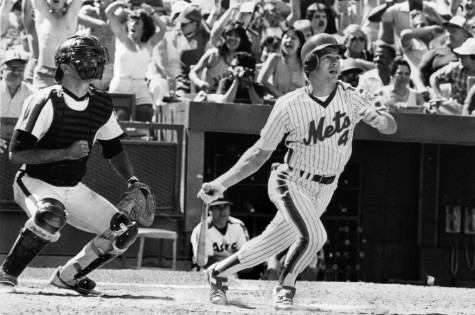
Lenny Dykstra is a man who has lived his life in grave fear. Even from his youth, he was a scared person. The inception of his innate fear was different from the majority of society’s phobias. It was not the dark that irked him; it wasn’t monsters; it was not a fear of harm or abandonment. Lenny ‘Nails’ Dykstra’s trepidation was that he would be just average.
He was born into a world that he saw as “The Middle” and would fight each waking moment with every ounce of his being to transcend this status he dubbed unacceptable for himself. The Nails that we have recently seen and heard promoting his new book all over newspapers, television, and radio is the remnants of the man who furiously wrestled against this fear every moment of his life. And let me tell you first hand, it’s one incredible story.
 Fear is an unparalleled motivator. The genesis of the gritty, reckless player we saw on the baseball field for twelve years, double the average for an MLB player, was this fear. It inspired the highest of highs and lowest of lows for the man they call Nails, which he documents in his work with no reservations.
Fear is an unparalleled motivator. The genesis of the gritty, reckless player we saw on the baseball field for twelve years, double the average for an MLB player, was this fear. It inspired the highest of highs and lowest of lows for the man they call Nails, which he documents in his work with no reservations.
Lenny’s fear motivated him to pinnacles of success that rival anyone’s boyhood dreams which are explained in poignant detail throughout the chapters. It led to some incredible highs in his professional life such as World Series appearances with both the Mets and Phillies, leading the National League in hits and on base percentage in 1990, as well as an MVP caliber season in 1993 where he led MLB in plate appearances and the NL in at-bats, runs scored, hits, and walks.
It also led to amazing and noteworthy stories from around the world in his personal life such as chance meetings with the likes of Robert DeNiro, Mickey Rourke, Charlie Sheen, and Michael Jordan. The stories involve how professional athletes and celebrities live to a degree of excess that is unfathomable to common folk such as us.
These stories are impressively chronicled in his work House of Nails that he penned himself after firing a ghost writer who he felt made the work too sensationalized and artificial. About the famed ghost writer he relieved of the responsibility, “It wasn’t his fault. It wasn’t personal,” Lenny said on the Opie and Jim Show on Sirius XM radio, “God himself couldn’t be my ghost writer. It had to come from me to be authentic.”
That same innate fear that stalked him his entire life, however, also brought him to failures of epic proportions. It led to his reliance on amphetamines, drugs, and prescription medication to perform at his unmatched level of intensity, his choice to use steroids, overextending himself financially after retirement, the failure of his marriage, and even his eventual incarceration.
He explains in detail the reasons why he chose to take performance enhancing substances prior to the 1990 season with the Phillies. His reasoning is consistent with his philosophy of ‘fearing the middle’. As he shares in his book, Lenny comments, “I am not proud to say I did it…I had to do it. I was not physically constructed to withstand an entire 162 game season particularly the way I played.”

Any fan of baseball or teammate of Dykstra will laud his enthusiasm and all or nothing attitude. He would stop at nothing to help his team win and to make the spectators and cities that supported him happy. Dykstra further rationalized his choice by adding, “I am going to be one of the 26 people in the whole world to start on a Major League Baseball team playing center field.”
Even more incredibly, he would have to be able to do it for years at Veterans Stadium, on a notoriously treacherous cement like playing surface
No matter what the challenge or avenue, Lenny Dykstra would dedicate all of his energy and attention into trying to become “The Best”. His pursuit of this status was almost obsessive. Whatever he chose to undertake became an all-consuming passion. He learned every nuance and studied every detail of said endeavor to make sure that he was maximizing his potential.
In this book, he details his playing philosophy that brought him to elite status. His fascinating take on hitting, pitch selection, and situational performance is definitely worth taking notice of. He later explains investment strategies that led him to draw the admiration of famed hedge fund manager Jim Cramer. His extremely complicated “deep-in-the-money” options trading system made me, an economics teacher, have to go back to my textbooks to understand it. (And by the way, it is sound, efficient, and a bit risky, which I am sure appealed to the gambler within him.) Lenny also details his business plan for the Players Club magazine, his ascension to business owning success with a chain of three car wash locations in California, and his role in ending the baseball labor stoppage in 1994.
His addictive personality would lead him to exploit every loophole and transcend every rule or regulation stopping at nothing to succeed. In his mind, if he failed, it was back to that ominous average and middle status. For Lenny, he would rather be dead than average. On a couple of occasions as he recounts, he almost was.
In this fantastic article in the Los Angeles Times by the esteemed Jim Murray which is referenced in House of Nails, Lenny is described a player who, “…doesn’t belong in this point in time anyway.” He was seen as a player who was born into the wrong era of baseball. This article was written 26 years ago and couldn’t be more applicable even today.

A lot of press has been generated over his comments about his time with the New York Mets. From someone who read every inch of this book twice, let me clarify some of them for you. Yes, he is critical of Davey Johnson. He all but blames him exclusively for the 1988 loss in the NLCS to the Dodgers. Amazing, huh? A person being critical of a coach for his decisions? I urge you to search any professional coach’s name on social media and see how many positive comments there are about them. Better yet, listen to some of the comments made by parents at your child’s next little league game.
By today’s standards, based on some of the skipper’s choices in that crucial series, Davey Johnson would have been run out of town a lot sooner. (See game 6 and 7 box-score if you don’t recall, or better yet read the book.) Why Davey? Reasoning is simple. He was contradictory to Lenny’s quest. His quest to be the best, to be all or nothing. Davey platooned Lenny with Mookie Wilson and sat him out of some big games. Dykstra wanted to play every single inning of every single game. How can we fault an athlete for that?
In almost all cases, he is complimentary of his teammates. Particularly Keith Hernandez‘s knack for the clutch hit, Ron Darling‘s yeoman like work ethic, as well as the importance of Gary Carter and the appreciation he keeps for a guy like Gary who was able to do it all and still ‘Play Clean’.
He explains to you what each person’s unique skill set brought to the table and only is critical of those who have mostly been criticized before. For example, George Foster‘s tirade against what he dubbed as the “racist Mets organization” for benching him for Kevin Mitchell (both were African American players, by the way) as well as Foster’s actions in the epic brawl between the Mets against the Reds in 1986 where he chose not to fight.
He is also critical of Greg Jefferies who he dubbed ‘A losing player’. Read any other book about the 1980’s New York Mets and this story will be corroborated. His book taught me that Greg Jefferies wrote a letter to WFAN to plea for fans and the media to stop criticizing him. Could you imagine the reaction in the twitter-sphere to something like this letter today?
You may not like his lifestyle. You may not like his crass personality, sometimes offensive choice of words, or his womanizing drug filled history. Chances are, though, if you were a Mets or Phillies supporter in the 1980’s or 1990’s this man was responsible for some of the best moments of your fanhood. Some of the comments taken out of context that have been recently published paint him as quite the villain who is telling tales out of school.
In the last two days I have been amazingly lucky to be granted direct access to Nails and his team. What I have seen is a gracious, generous, and humorous man that has lived an unparalleled life and wishes to tell us all about it. I for one am thankful that he did, because he was unquestionably my favorite player on my favorite team during my favorite time in it’s history. I highly recommend you take the opportunity to review his life.















